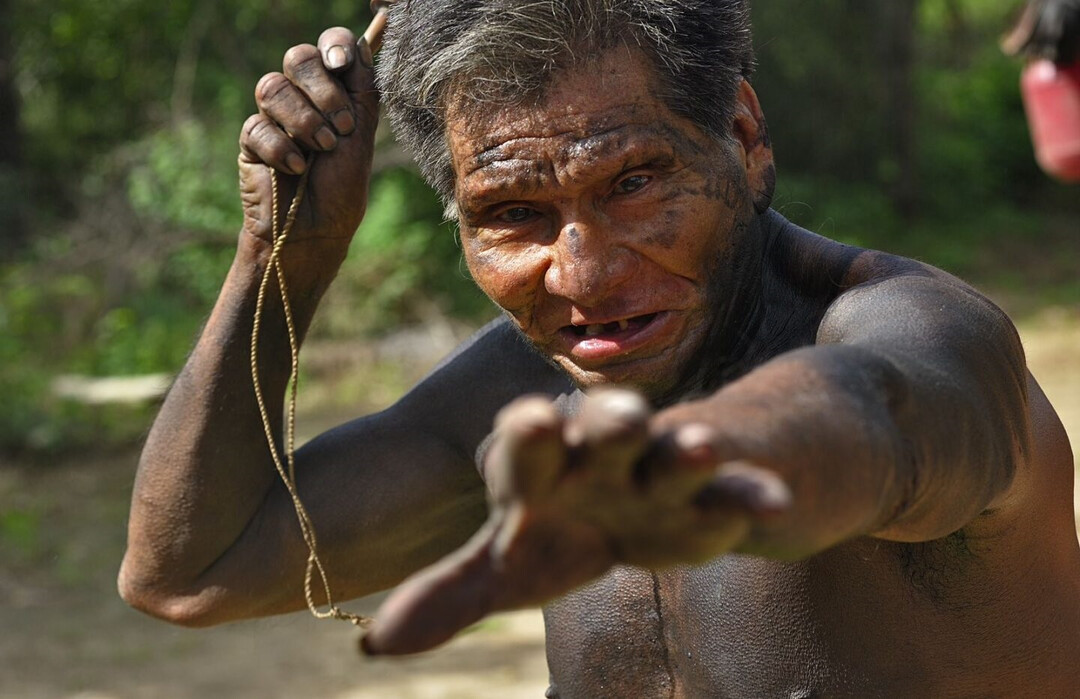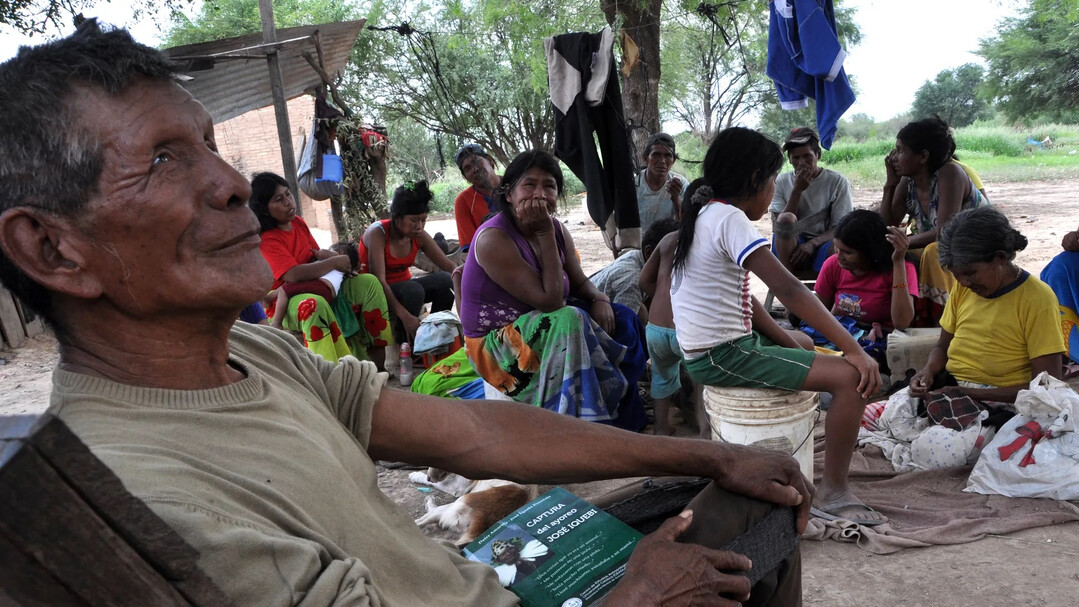
Filadelfia, Paraguay - As the vast forests and grasslands of Paraguay's northern Chaco region are transformed into immense cattle ranches, the survival of one of the world's last remaining uncontacted tribes outside the Amazon, the Ayoreo, hangs in the balance.
An estimated 150 uncontacted Ayoreo people continue their hunter-gatherer lifestyle in isolation. However, rampant deforestation surrounding a massive ranch known as Faro Moro is rapidly destroying their ancestral lands. Indigenous communities and environmental organizations are sounding the alarm, calling this a grave crisis that could lead to "cultural extinction" and demanding urgent action.
Kidnapping and Forced Labor: The Painful History of the Ayoreo
José Iquebi, an 84-year-old Ayoreo elder, vividly recalls the horrific memories of his childhood. Around the age of 12, he was kidnapped by men on horseback while hunting wild pigs in the forest. They tied him with ropes, caged him, and dragged him to Paraguay's capital, Asunción, where he was put on display for paying onlookers. "They treated us like animals," he recounted. It took decades before he could return to his nomadic community.
The colonization of the Chaco region, which began in earnest in the 1920s, was largely driven by the arrival of German-speaking Mennonites from the Soviet Union and Canada. Promised "undeveloped land" by the Paraguayan government, they migrated to territories that were already home to the Ayoreo people. Mennonite missionaries sought to capture and convert the indigenous population, a process that led to devastating epidemics that decimated the Ayoreo. Survivors were often forced into labor, clearing forests or tending cattle, shattering their traditional way of life.
Deforestation at Faro Moro Ranch: A Crisis for Survival
Until recently, the Faro Moro ranch encompassed 40,000 hectares (approximately 99,000 acres) of forest, serving as a habitat for endangered jaguars. However, satellite imagery from early 2023 onwards reveals that at least 13,000 hectares (approximately 32,000 acres) of forest have been cleared and converted into pastureland. This area, known to the Ayoreo as 'Tamucode,' is believed to be a crucial territory for the uncontacted group, rich in game and water resources.
Guei Basui Picanerai (43), a leader from the contacted Ayoreo community of Ebetogue, stated, "We believe our uncontacted brothers live there because it's a place with water even in droughts." Ranchers, however, deny this, claiming there is no evidence of human presence in the area.
Hekopora SA, a Paraguayan company, leases and operates the ranch and has environmental permits to clear over half of its forest. Andrés Cramer, the company's vice president, countered, "In 35 years of continuous monitoring, there has been absolutely no evidence of human habitation, no people, no footprints, no campfire remains."
Conversely, the Ayoreo community and the non-profit organization Iniciativa Amotocodie claim to have collected dozens of signs around Faro Moro. These include marks on felled trees indicating honey extraction, tribal markings on bark, abandoned wasp nests, and sounds of whistling and singing emanating from the forest. Some residents have even reported finding unidentified footprints near their village in the early morning, along with missing salt and metal tools.
Conflicting Claims and Legal Battles
The owner of the Faro Moro ranch is Faro Moro Limited, registered in the Isle of Man, with Austrian timber entrepreneur Peter Kaindl and Dane Henrik Buchleitner listed as directors. They have not issued any official statements regarding the controversy. Meanwhile, Hekopora SA, which manages the ranch, is linked to AgrInvest, a German agricultural investment firm based in Hamburg, raising concerns about developed nations contributing to biodiversity destruction in developing countries.
In May of last year, the Ayoreo community filed a lawsuit in the court of Filadelfia, a Mennonite colony, demanding a halt to the deforestation, but their case was dismissed. They are now preparing to appeal to the Inter-American Court of Human Rights. Their lawyer, Marilina Marichal, criticized, "Paraguay has promised to protect indigenous people through international treaties and its constitution, but the reality is no different from feudal times."
On the other hand, the Paraguayan Agricultural Association and Mennonite leaders dismiss the existence of uncontacted tribes as a "fabricated conspiracy," arguing that cattle ranching is essential for the local economy. Werner Schroeder, president of a local ranching lobby group, pointed to the lack of evidence, stating, "They haven't even presented a single photograph."
The Chaco region faces additional threats from climate change, including extreme droughts and wildfires. In September of last year, a fire that started on a deforested section of the ranch burned 200,000 hectares (approximately 495,000 acres) of Ayoreo territory. The planned Bioceanic Corridor highway, slated for completion in 2026, and lithium mining projects are also expected to further pressure the forest and indigenous lives.
However, voices of change are emerging from within the Mennonite community. Riky Unger, principal of the Neuland school, acknowledged, "We deprive the indigenous people of their identity and then blame them," urging recognition of past wrongs and the need to preserve the forest.

Paraguay's Ayoreo Indigenous People in the Chaco Region Face Extinction Due to Climate Change and Environmental Destruction
The dense forests of the Gran Chaco region in northwestern Paraguay were once the ancestral homeland of the Ayoreo indigenous people. However, due to climate change and human-caused environmental destruction, this native community now stands at the brink of survival. Experts warn that the Ayoreo are one of the fastest disappearing indigenous communities in South America.
For centuries, the Ayoreo have lived a hunter-gatherer lifestyle in the dry forests and savannas of the Chaco region. They have lived in harmony with nature, but in recent decades, rapid environmental changes have threatened their way of life. Extreme droughts and heatwaves caused by climate change have depleted water and food resources, while deforestation and agricultural development have destroyed their habitats. In particular, the expansion of large-scale cattle ranching and soybean farming into the Chaco region has undermined the Ayoreo people's traditional migration routes and survival base.
According to the environmental organization Survival International, some Ayoreo people still live in isolation, uncontacted by the outside world. They are known as the last remaining 'uncontacted tribes' in South America, and their numbers are estimated to be less than 100. However, as the forests disappear, they are increasingly confined to smaller areas, exposing them to the risks of external diseases and conflicts.
The Paraguayan government is actively promoting agricultural and infrastructure projects to boost economic development in the Chaco region. However, this is exacerbating the threat to the Ayoreo people's survival. Over the past decade, more than 20% of the forest in the Chaco region has been lost, and this, coupled with the ecological collapse due to climate change, is accelerating the Ayoreo people's risk of extinction.
Experts point out that "climate change and environmental destruction are not just environmental issues." They emphasize that "indigenous communities like the Ayoreo depend on nature for their culture and way of life, so when the forest disappears, their identity also disappears." The international community is urged to protect their rights and regulate the indiscriminate development in the Chaco region.
A member of a contacted Ayoreo tribe expressed his desperate feelings, saying, "If the forest dies, we die too." Amidst the double burden of climate change and environmental destruction, their voices are increasingly being silenced. If Paraguay and the international community do not take immediate action, the Ayoreo people may disappear from history forever.
[Copyright (c) Global Economic Times. All Rights Reserved.]



























